In the realm of interior design, the bedroom has evolved from a simple resting place into a canvas of personal expression and functionality. As modern lifestyles increasingly embrace the blend of aesthetics and practicality, contemporary bedroom spaces are transforming into sanctuaries where comfort meets innovative design. This article invites you to explore the principles of functional design that define today’s bedrooms, showcasing how thoughtful layouts, versatile furnishings, and mindful decor can create environments that not only reflect individual style but also cater to the varied rhythms of daily life. Join us as we delve into the art of crafting modern comfort, where every element serves a purpose, and every detail contributes to an oasis of tranquility and efficiency.
Exploring the Essence of Minimalism in Modern Bedroom Design
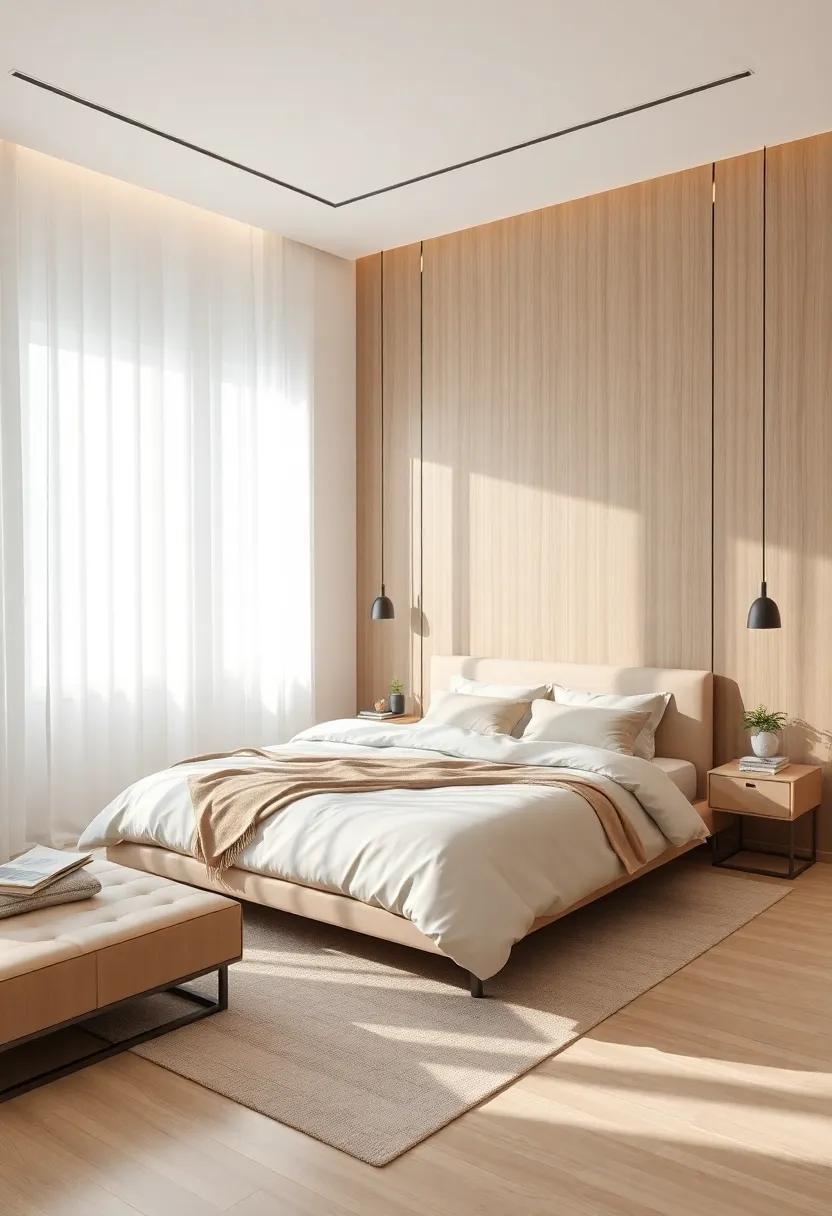
The essence of minimalism in modern bedroom design revolves around the principle of “less is more,” where simplicity and functionality take precedence over ornate decorations. Stripped-back aesthetics create a tranquil ambiance that not only promotes relaxation but also enhances mental clarity. Common features include minimalist furniture, neutral color palettes, and natural light, which collectively contribute to a serene space that’s easy to maintain. Essentials are prioritized, resulting in an uncluttered atmosphere that encourages mindfulness and peace, allowing homeowners to reconnect with their personal sanctuary.
To truly embody minimalist principles, designers often incorporate multi-functional pieces that serve more than one purpose, reflecting the need for versatility in contemporary living. Such items might include storage beds, modular shelving, or folding desks that can seamlessly blend into the room when not in use. Emphasizing quality over quantity,materials are thoughtfully chosen to enhance the overall aesthetic without overwhelming the space. This curated approach not only optimizes functionality but also establishes a strong connection with nature through the use of sustainable materials, promoting a sense of harmony in the home. For further insights into minimalist design, visit minimalism.com.
The harmony of Natural Light: Maximizing Windows and Open Spaces
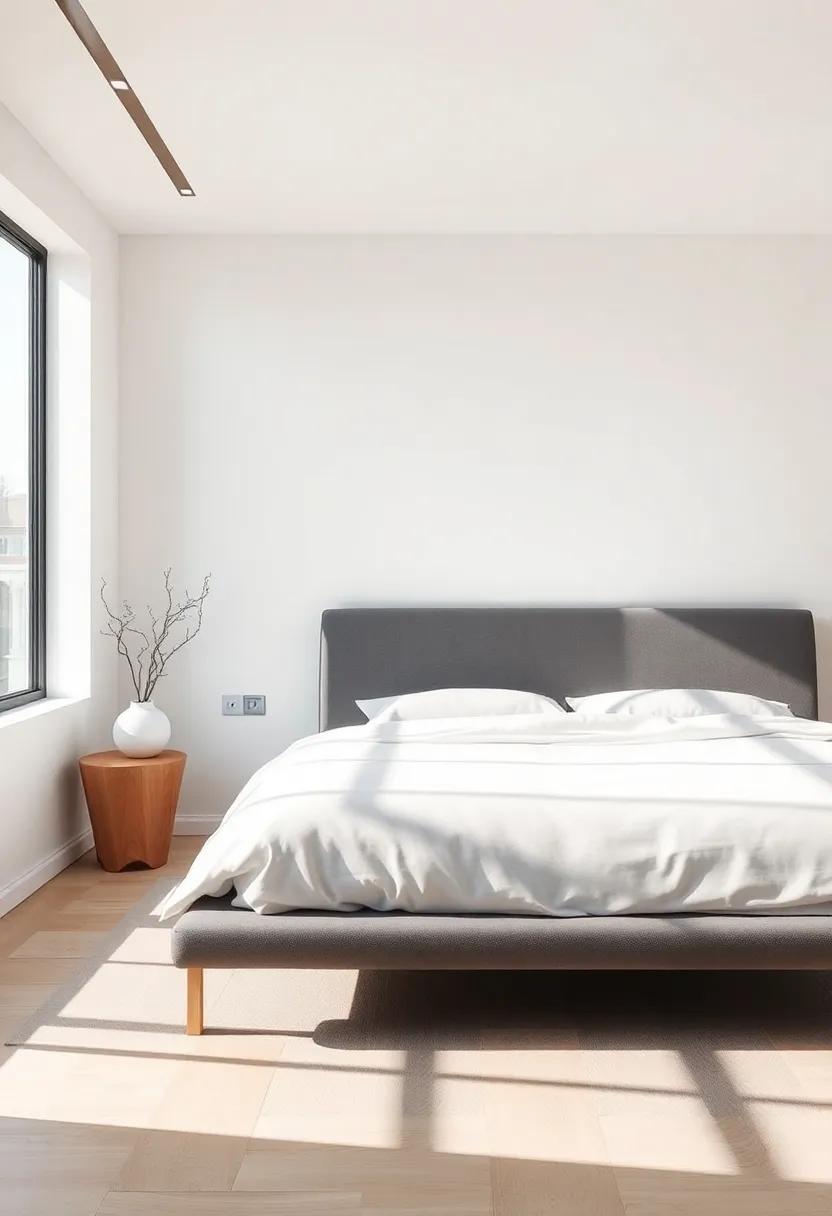
Embracing natural light in bedroom designs not only enhances the aesthetic appeal but also promotes a serene atmosphere conducive to relaxation. Large windows and open spaces can create a seamless transition between the indoors and outdoors, allowing sunlight to flood the room and breathe life into the decor. Consider incorporating features such as:
- Floor-to-ceiling windows: Maximizing the view and light exposure.
- Skylights: Infusing brightness from above while maintaining privacy.
- Sliding doors: Offering easy access to balconies or gardens.
This harmonious integration of light not only elevates the room’s ambiance but can also enhance the functionality of the space. Strategic placement of mirrors can reflect light, further expanding the feeling of openness.To achieve an inviting habitat, one might consider the use of muted colors that amplify the natural light effect, creating a tranquil retreat. A combination of elements such as:
- Neutral wall tones: Reflecting light and enhancing spaciousness.
- Open shelving: Allowing light to flow unobstructed.
- Layered textiles: adding warmth while maintaining an airy feel.
When designing these spaces, exploring resources on architecture and design can provide inspiration. As an example, websites like Architectural Digest showcase innovative designs that celebrate natural light.
Layering Textures for a Cozy Yet Sophisticated Bedroom retreat
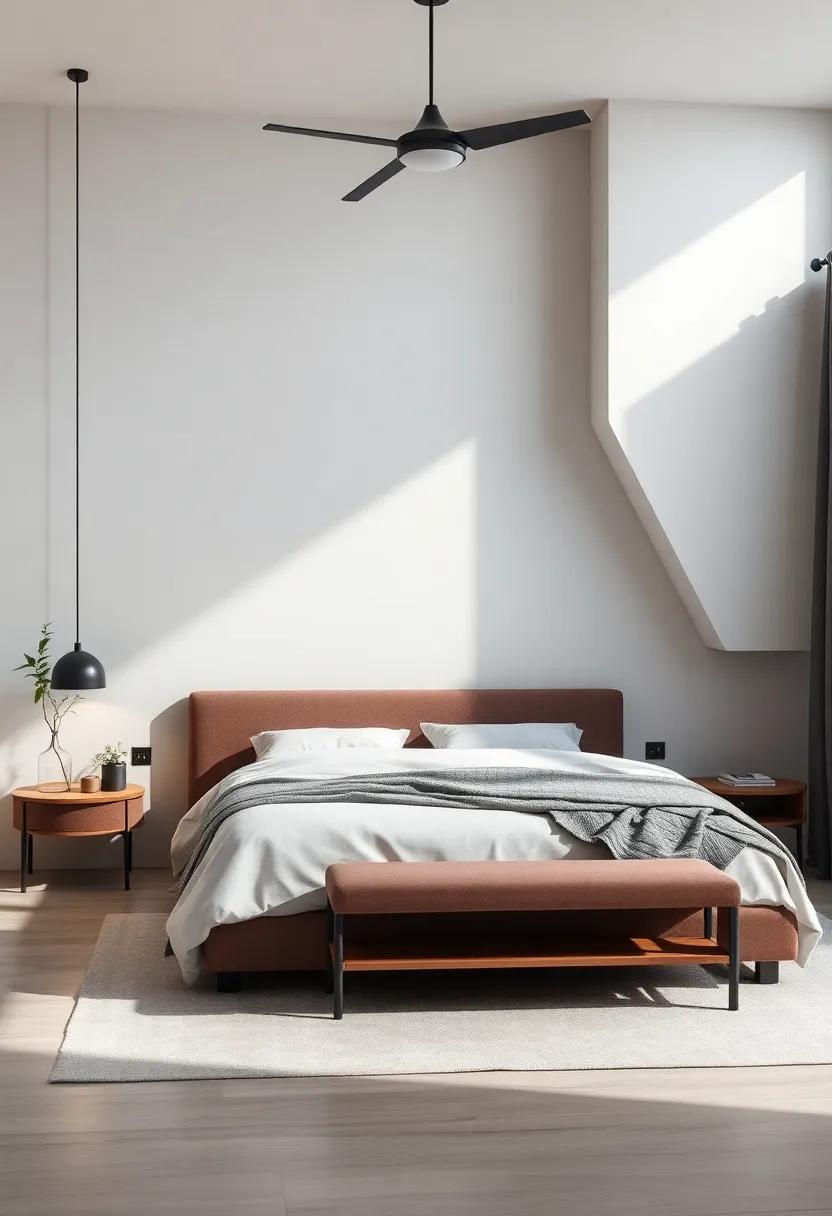
Transforming your bedroom into a sanctuary of comfort and sophistication starts with the art of layering textures. Begin with a foundation of soft linens and plush fabrics to invite warmth into the space. Consider combining the following materials to create visual interest and tactile pleasure:
- Cotton or linen sheets for breathability
- Velvet throw pillows to add depth
- Wool or cashmere blankets for warmth
- Textured area rugs to define zones within the room
Attention to detail matters; adding elements such as a chunky knit throw, or a basket filled with soft blankets can enhance the inviting feel. Decorative accents like upholstered headboards or rattan details on nightstands can bring a touch of elegance while maintaining functionality. To further curate your retreat,introduce subtle patterns and complementary colors that reflect your personal style and enhance the overall ambiance. for example:
| Material | Color Palette | Effect |
|---|---|---|
| Textured linens | Soft earth tones | Calming atmosphere |
| silk accents | Rich jewel tones | A touch of Luxury |
| Natural fibers | Neutral shades | Organic warmth |
Ultimately, the goal is to envelop yourself in a setting that is not only beautiful but also functional. For more inspiration on design techniques that merge aesthetics and comfort, visit Architectural Digest.
Color Psychology: Choosing a Palette for Tranquility and Focus
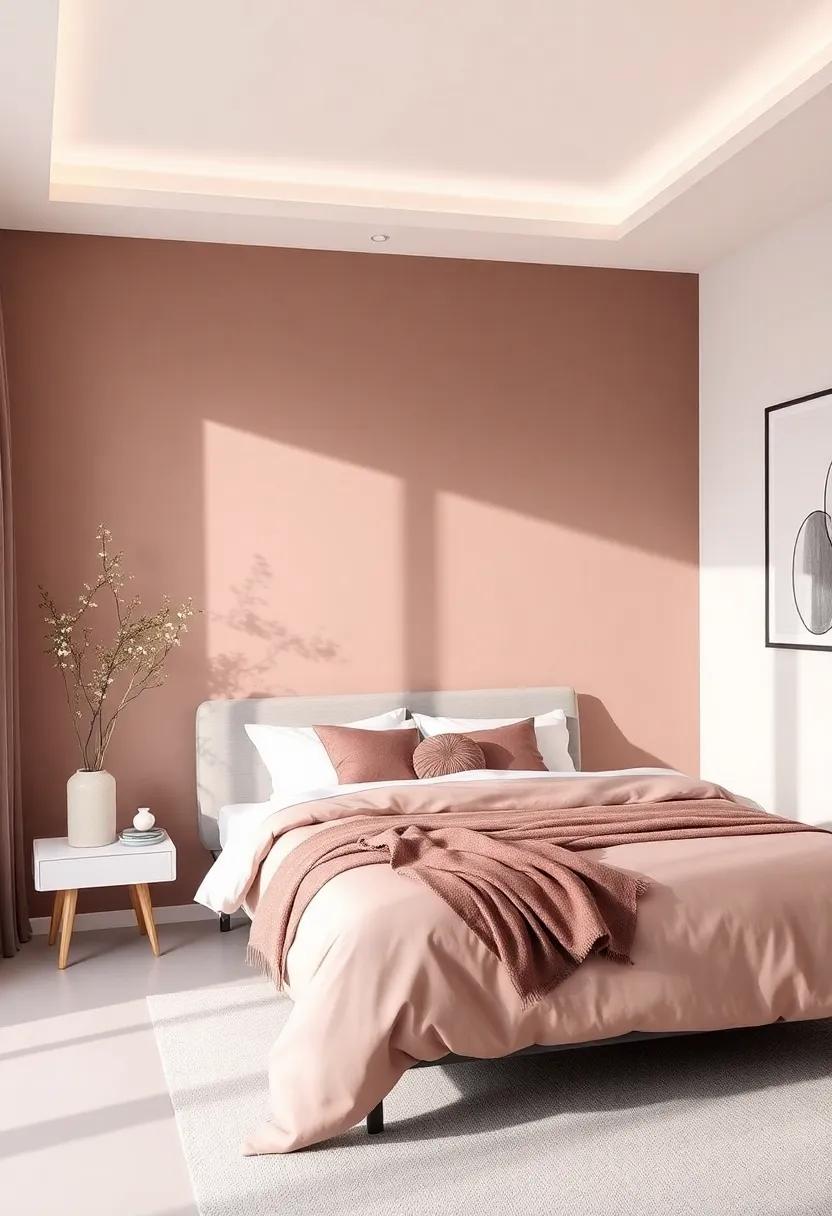
Choosing the right colors for your bedroom can considerably influence your mood and productivity.Soft greens and muted blues are often recommended for their serene qualities, promoting a sense of calm and focus. when selecting your palette,consider incorporating colors that are known for their tranquil effects,such as:
- Pale Blue: Evokes a sense of peace and promotes restful sleep.
- Soft Green: Represents nature,bringing a refreshing and rejuvenating vibe.
- Warm Neutrals: Create a cozy atmosphere while allowing other colors to stand out.
To enhance these colors, utilize natural light and strategic lighting fixtures, which can elevate the overall ambiance. Textures and fabrics also play a crucial role; opt for organic materials like cotton and linen in soft hues to ensure that your space feels both agreeable and focused. Here’s a simple table showcasing colors and their psychological effects:
| Color | Effect |
|---|---|
| Pale Blue | calmness and clarity |
| Soft Green | Restoration and balance |
| Warm Beige | Comfort and relaxation |
By thoughtfully designing your color scheme, you can create a sanctuary that not only reflects your style but also supports emotional well-being and productivity. For more insights on color psychology, visit Verywell Mind.
Innovative Storage Solutions: Merging Style With Functionality
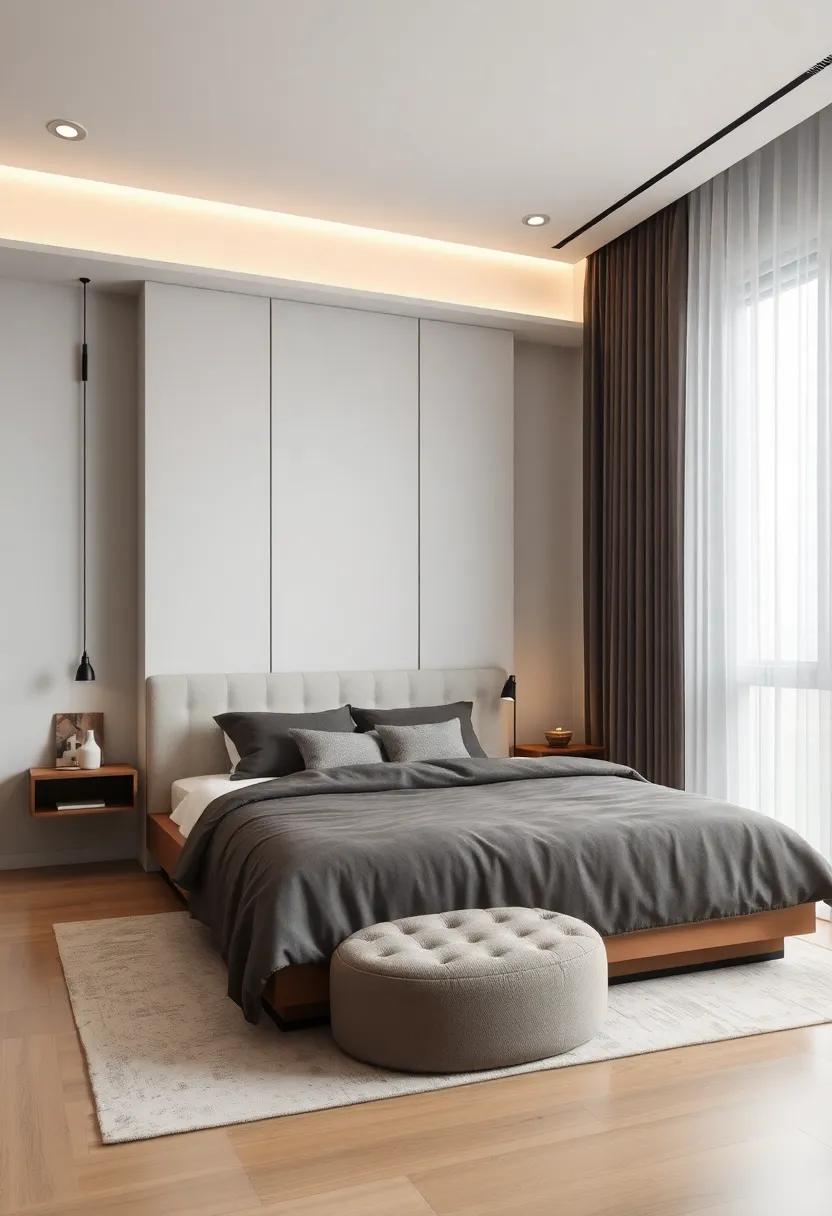
In contemporary bedroom designs, innovative storage solutions play a pivotal role in achieving both aesthetic appeal and functional efficiency.Modern furniture pieces are now being crafted not only for comfort but also for their ability to cleverly conceal and organize items. Think of beds with integrated drawers, stylish ottomans that double as storage bins, or sleek nightstands with hidden compartments. These clever designs can transform cluttered spaces into serene sanctuaries, allowing you to maintain a minimalist look without sacrificing practicality.
Besides traditional furniture, new-age concepts like modular shelving units and wall-mounted lockers provide additional versatility in storage. These options offer customizable arrangements that can be adjusted according to personal needs and room dimensions. some popular features to look for include:
- Hidden pull-out racks for accessories
- Multi-level shelves for maximizing vertical space
- Color-coordinated baskets to enhance visual harmony
- Integrated charging stations for electronics
| Type of Storage | Benefits |
|---|---|
| Under-Bed Storage | Utilizes often-overlooked space to keep seasonal items. |
| Wall Units | Adds artistic elements while providing ample storage. |
| Bedside Caddies | Keeps essentials within arm’s reach for convenience. |
Ultimately, the integration of innovative storage solutions not only optimizes space but also elevates the overall aesthetic of a bedroom.Such thoughtful design raises the level of comfort and institution,allowing homeowners to create sanctuaries of rest that are as stylish as thay are functional. Explore more about these transformative ideas at Apartment Therapy.
Furniture Selection: Blending Aesthetics and Practical Everyday Use
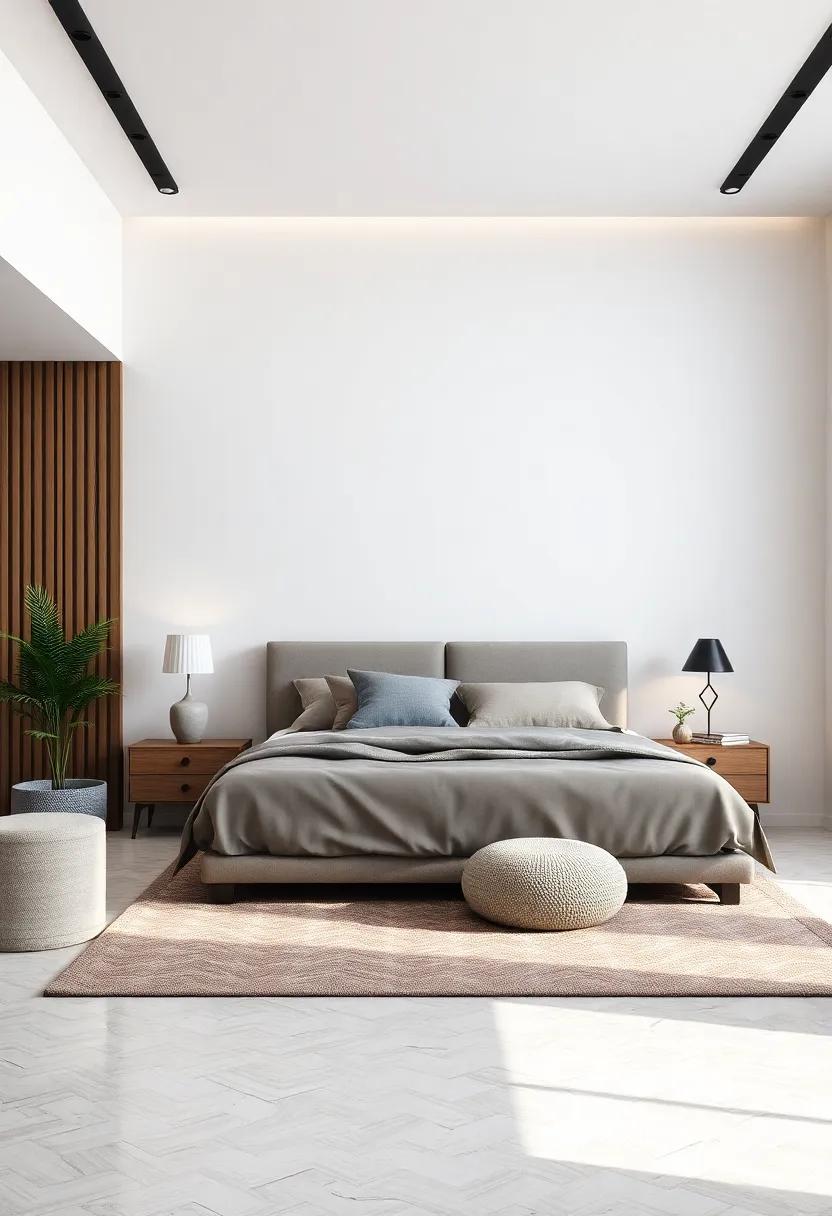
In the realm of contemporary bedroom design, the intersection of form and function is paramount. Selecting the right furniture involves a deep understanding of both aesthetic appeal and practical submission. The ideal pieces should not only enhance the visual interest of the space but also cater seamlessly to daily activities, ensuring comfort and utility. Consider integrating elements that serve dual purposes, such as bed frames with built-in storage, or bedside tables that also work as charging stations.When curated thoughtfully, such selections can transform your sanctuary into a harmonious blend of style and purpose.
Color palettes and materials play a meaningful role in furniture selection,impacting both the atmosphere and functionality of the bedroom. Soft, muted tones can create a serene environment, while bold accents and textures can add a touch of personality.It’s essential to choose materials that are durable yet inviting, such as plush upholstery or sleek wooden finishes. Additionally, incorporating elements like adaptable lighting can enhance both ambiance and practicality. Here’s a fast overview of must-have furniture pieces that marry aesthetic and functionality effectively:
| Furniture Piece | Aesthetic Features | Functional Benefits |
|---|---|---|
| Platform Bed | Minimalist Design | Under-bed Storage |
| Nightstand | Stylish Finish | Charging Ports |
| Dresser | Elegant Lines | ample Storage |
| desk | Modern Aesthetic | Workspace utility |
To dive deeper into the nuances of functional design, you can explore more insights on dwell.com. Remember, the goal is to create a space that not only looks good but feels good—transforming your bedroom into a personalized retreat.
Biophilic Design: Incorporating Nature to Enhance Relaxation
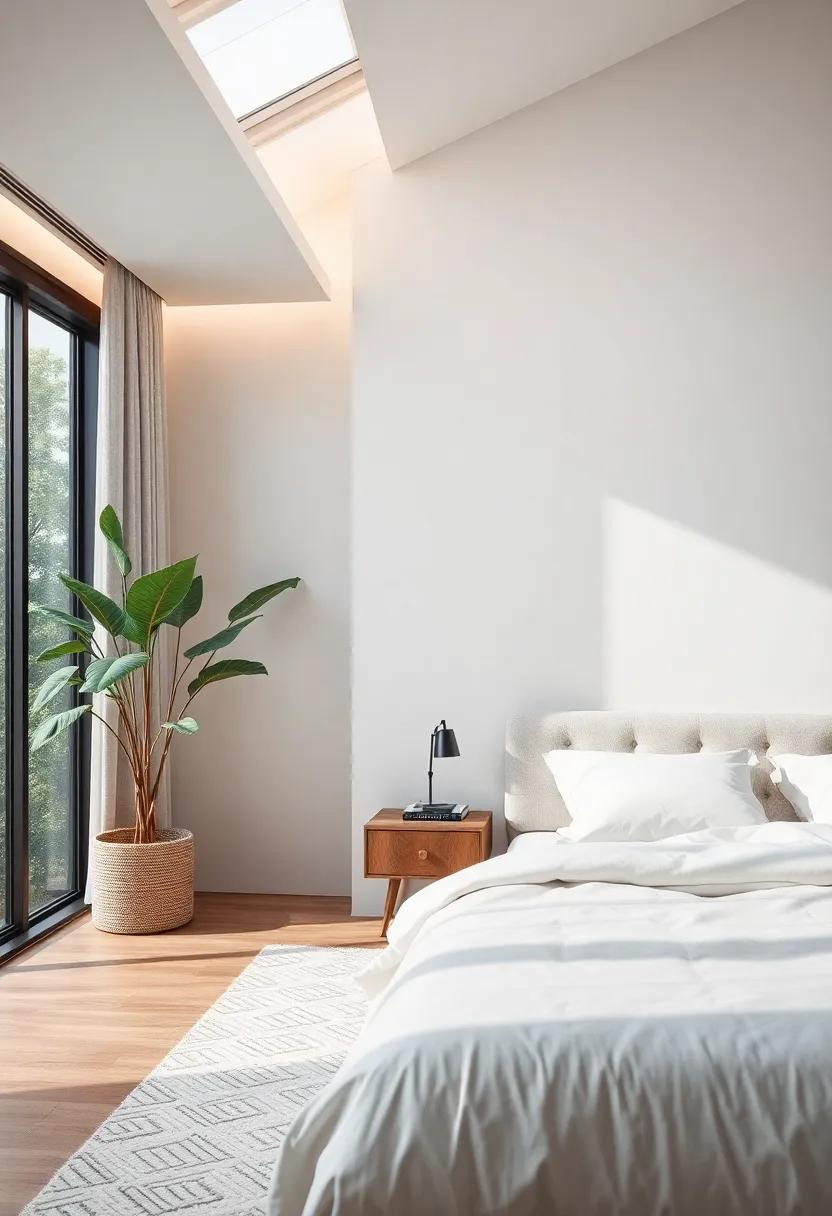
Integrating elements of the natural world into contemporary interiors offers a pathway to transforming bedroom spaces into serene sanctuaries. Techniques like maximizing natural light through large windows or utilizing soft, organic materials can greatly contribute to a calming atmosphere. When choosing colors, opt for earthy tones that mimic the hues of nature, such as greens, browns, and soft blues. These color choices can enhance the sense of relaxation, inviting tranquility into your personal retreat. Additionally, including indoor plants such as ferns or peace lilies can purify the air and add a touch of lush greenery, creating a connection to the outdoors.
Moreover, the incorporation of natural textures, such as wood, stone, or bamboo, draws attention to the natural cycles and elements often overlooked in modern life. By designing with intention, consider adding features like a feature wall made of reclaimed wood or a stone accent that serves as both aesthetically pleasing and grounding. Essential elements to incorporate include:
- Natural Light: Maximize sunlight exposure to boost mood.
- Greenery: Use a variety of plants for a vibrant touch and health benefits.
- Natural Materials: Incorporate organic textiles and surfaces for comfort.
| Element | Benefits |
|---|---|
| indoor Plants | Air purification, reduces stress |
| Natural Lighting | Improved mood and productivity |
| Water features | soothe the mind; enhance serenity |
For more insights on how to effectively blend natural elements into your design, visit Architectural Digest.
Smart Technology Integration for Effortless Living Spaces
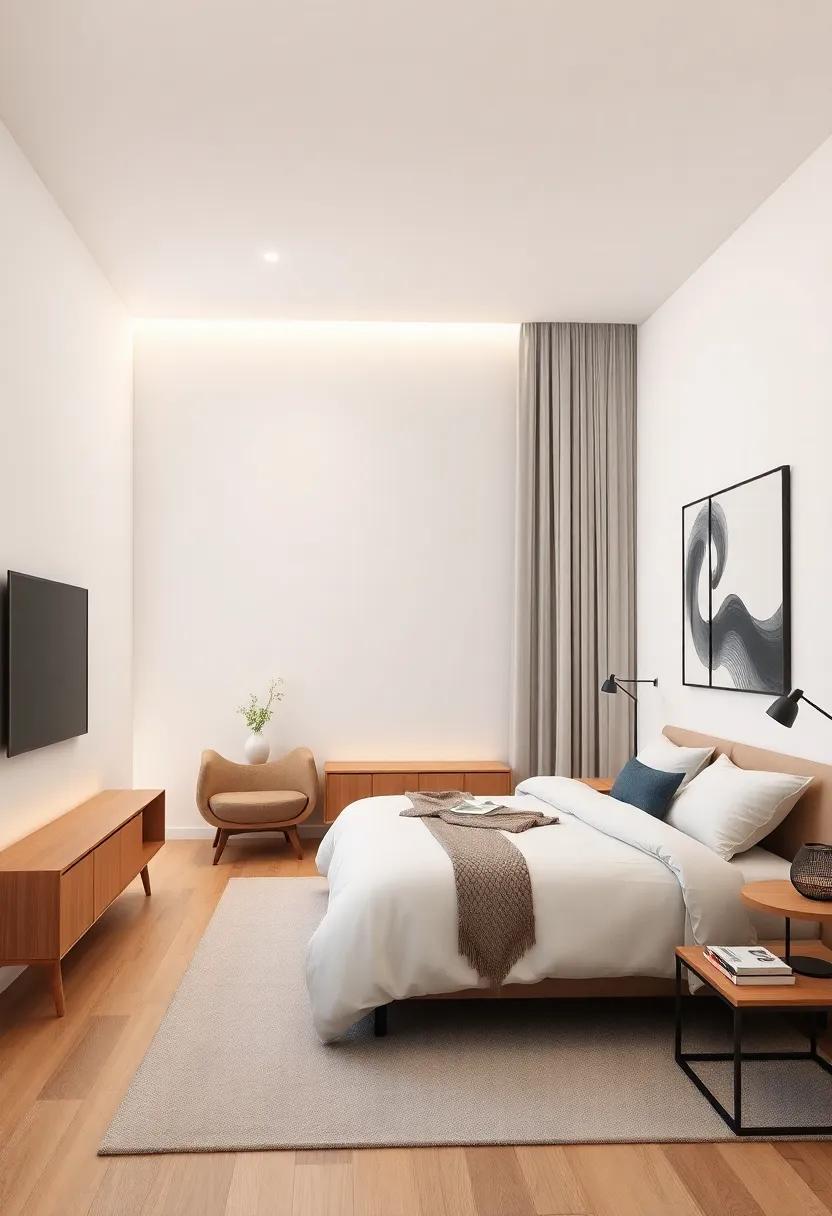
Contemporary bedroom spaces increasingly incorporate smart technology to enhance comfort and functionality. Imagine waking up to soft, adjustable lighting that mimics the natural sunrise, gradually brightening to help you ease into your day. Smart thermostats ensure that the room temperature is always just right,adjusting automatically according to the weather and your personal preferences. Additionally,integrated audio systems allow for seamless enjoyment of your favorite music or podcasts,creating the perfect atmosphere without the clutter of traditional devices.
Moreover, the integration of automation brings an unparalleled level of convenience. Home assistants can control lighting, curtains, and other electronic devices with simple voice commands or through a mobile app. This technology not only streamlines daily routines but also promotes a serene environment, free from distractions. Features such as smart mirrors, which display the news or weather while you prepare for the day, and wireless charging areas eliminate the need for unsightly cords, making the bedroom a sanctuary of seamless design. To explore more on how smart technology is shaping modern interiors, visit Forbes.
Sustainable Materials: Designing with Eco-Friendly Considerations
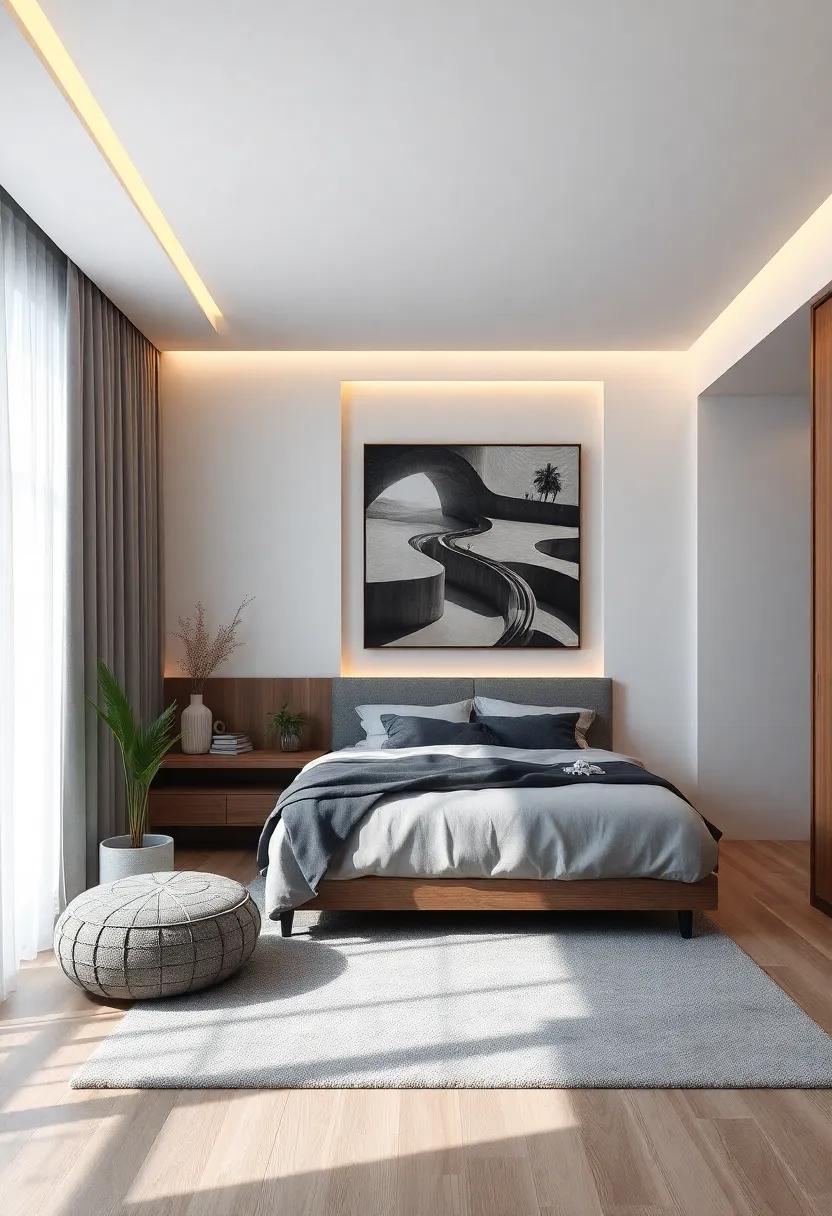
In the quest for modern comfort, incorporating eco-friendly materials into bedroom designs elevates both aesthetics and sustainability. Utilizing natural fibers such as organic cotton, bamboo, and linen not only promotes a healthier living environment but also supports breathable, luxurious textiles that enhance relaxation. an emphasis on recycled materials, like reclaimed wood and repurposed metals, allows designers to craft unique furniture pieces that tell a story while minimizing waste. The use of low-VOC (volatile organic compounds) paints and finishes contributes to better indoor air quality, demonstrating that conscious choices can seamlessly blend with stylish design.
When curating a bedroom that reflects both comfort and environmental obligation, consider integrating these key sustainable elements:
- Non-toxic paints: Choose paints free from harmful chemicals.
- Energy-efficient lighting: Opt for LED fixtures that reduce energy consumption.
- Upcycled decor: Incorporate vintage or upcycled items to add character and reduce waste.
By prioritizing these thoughtful choices, your bedroom can become a sanctuary that embodies both style and eco-awareness. For more insights on sustainable practices, visit Green Home Guide.
Artful Arrangements: How to Curate a personalized Space
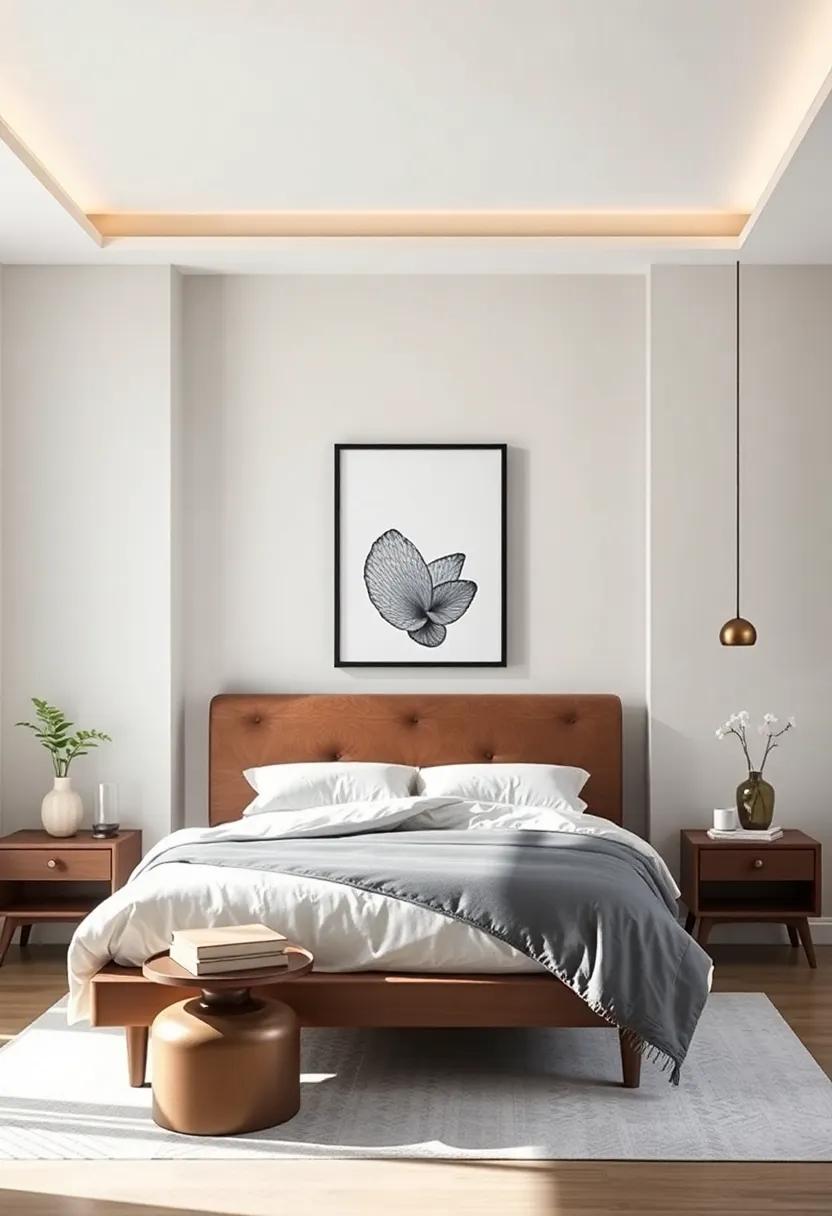
Creating a personalized space is akin to penning a visual narrative that reflects your unique tastes and lifestyle. Start by selecting a color palette that resonates with your personality; soft pastels can evoke tranquility,while bold hues provide energetic focal points. Incorporate textured elements like woven baskets and plush throws to add depth, making the room feel inviting and layered.Each piece should have it’s own story, whether it’s a vintage clock passed down through generations or a locally-sourced artwork that captures your community’s spirit.To weave these elements together seamlessly, consider creating a mood board as a reference, helping you visualize the finished space.
Curating your environment also involves a thoughtful arrangement of furniture and decor. Utilize multi-functional pieces like a bed with built-in storage or an ottoman that doubles as seating, perfect for maintaining both style and practicality. Organizing decor in groups of three or five can create visual harmony; use shelves, tables, or walls to exhibit an eclectic mix of art, books, and personal mementos. Remember, absolutely no element is too small to contribute to the overall aesthetic; even small plants or scented candles can pull together the theme of your room. For more inspiration on tailoring your space, explore resources at Houzz.
The Role of Multi-Functional Furniture in Compact Bedrooms
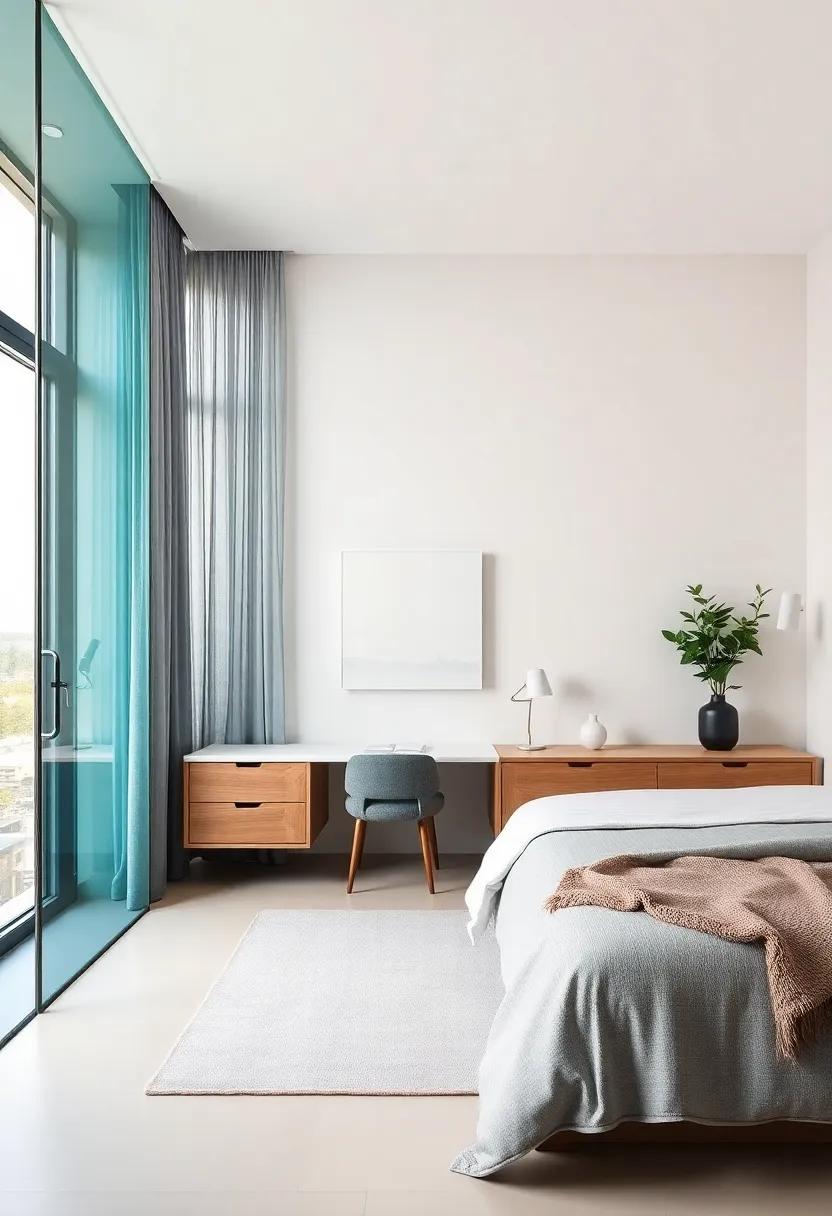
In the quest for maximizing space in compact bedrooms,multi-functional furniture emerges as an invaluable asset. Available in various designs, these versatile pieces not only optimize storage but also elevate the overall aesthetic. As a notable example,a bed with built-in drawers can elegantly conceal linens or seasonal clothing,while a collapsible desk transforms an ordinary corner into a functional workspace. Such dual-purpose items exemplify how thoughtful design can merge convenience and style, resulting in a room that feels larger and more inviting.
To enhance the functionality of your sleeping quarters, consider the following features of multi-functional furniture:
- Modularity: Pieces that can be rearranged or combined to suit different needs.
- Convertible Designs: Sofa beds and transformable tables that serve multiple purposes.
- Storage Integration: Items like ottomans or benches with hidden compartments to keep clutter at bay.
By integrating these elements,compact spaces can effuse both comfort and practicality,ensuring that each square foot is utilized effectively. Organizations like Apartment therapy provide additional insights into creating beautiful yet functional living areas, demonstrating how design can harmoniously enhance everyday life.
lighting Effects: Creating Atmospheres with Innovative Fixtures
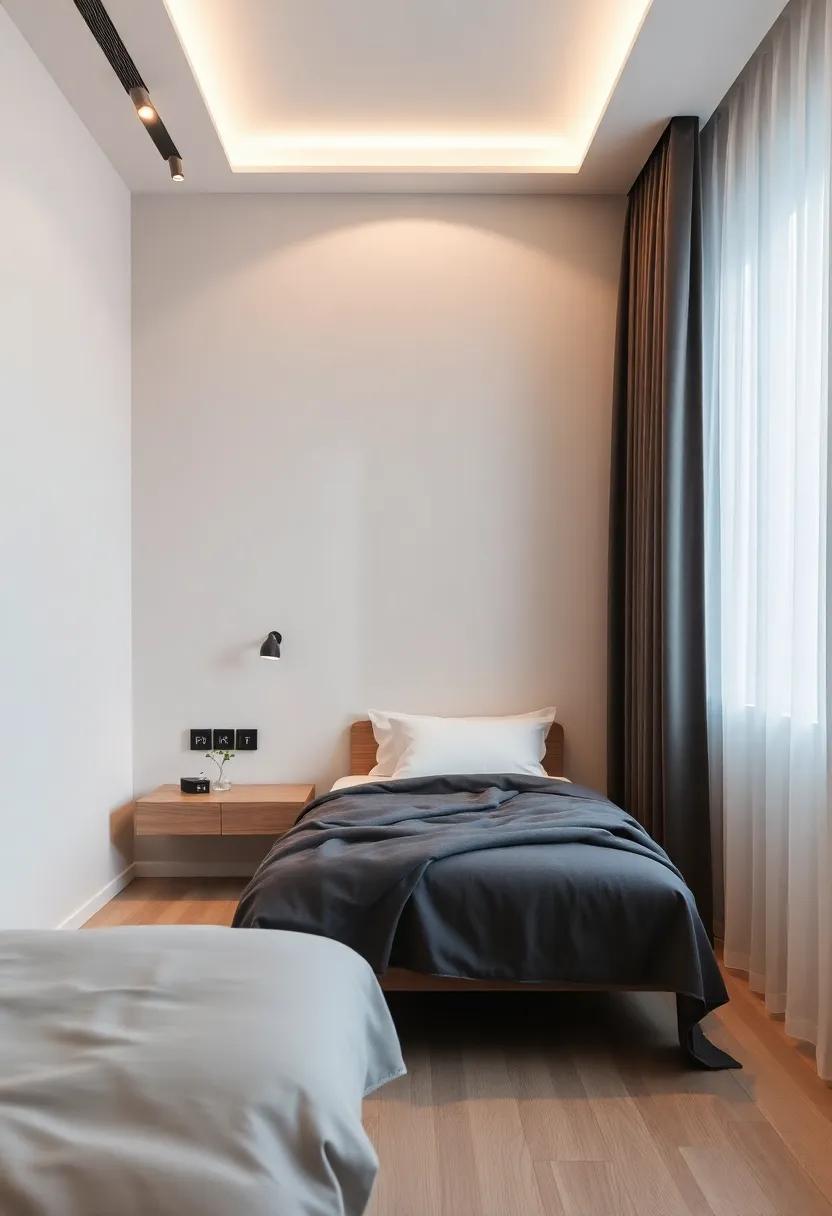
Innovative lighting fixtures play a pivotal role in shaping the mood and functionality of contemporary bedroom spaces. By utilizing a mix of ambient, task, and accent lighting, designers can create visually stunning atmospheres that cater to both relaxation and productivity. Consider incorporating pendant lights above nightstands or a statement chandelier as a focal point. This layering technique not only enhances aesthetics but also allows for versatility in illumination, making it easier to transition from a luminous magazine reading environment to a cozy evening retreat simply by adjusting the light settings.
To maximize the impact of lighting, it is essential to select fixtures that complement the overall design theme of the space. Here are some popular choices for modern bedrooms:
- LED Strip lights: Ideal for creating soft backlighting behind headboards.
- Floor Lamps: Perfect for adding height and drama, especially in corners.
- Smart Bulbs: Offer customizable colors and brightness levels based on mood or time of day.
- Sconce Lighting: Great for saving space while providing functional light near the bed.
By embracing diverse lighting solutions, homeowners can transform their bedrooms into sanctuaries of comfort and style, reflecting personal tastes while enhancing overall functionality. Explore more about how to integrate these elements seamlessly into your home design at architectural Digest.
Emphasizing Comfort: Selecting the Perfect Bedding for Sleep
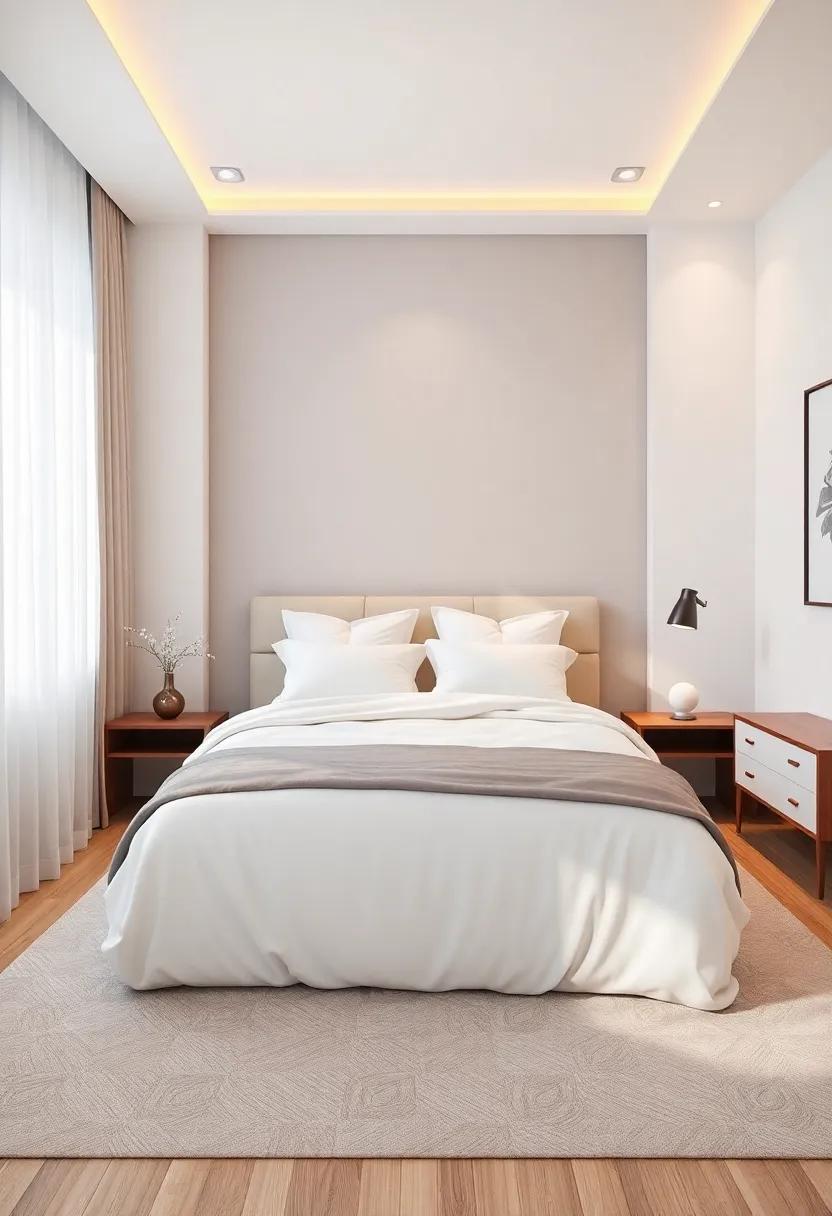
When it comes to achieving an inviting atmosphere in your bedroom, the choice of bedding plays a pivotal role in delivering both aesthetic appeal and comfort. Opting for luxurious materials such as organic cotton, linen, or bamboo not only enhances the tactile experience but also ensures breathability, keeping you cool in the warmer months and snug when temperatures drop. Here are essential features to consider for your bedding selection:
- Thread Count: A higher thread count often translates to softer sheets and more durability.
- Fill Material: Down, synthetic, or wool fill can dramatically affect warmth and comfort.
- Design and Color: Calming hues and natural patterns can create a serene environment.
Your mattress and pillow choices are foundational components that dictate the quality of your sleep. A well-suited mattress, whether it’s memory foam, innerspring, or hybrid, should align with your personal comfort preferences and sleeping position. Coupled with the right pillow – be it contour, support, or cooling – these choices adapt to your body’s unique needs. To help illustrate the impact of different bedding components, consider the following comparison of popular materials:
| Material | Comfort Level | Maintenance |
|---|---|---|
| Organic Cotton | Excellent | Low |
| Bamboo | High | Medium |
| Linen | Good | High |
By blending the right materials with thoughtful design, your bedding can transform your bedroom into a soothing sanctuary. Explore various options at Sleep Foundation to find the perfect combination for your contemporary retreat.
Spatial Orientation: Arranging Furniture for Optimal Flow
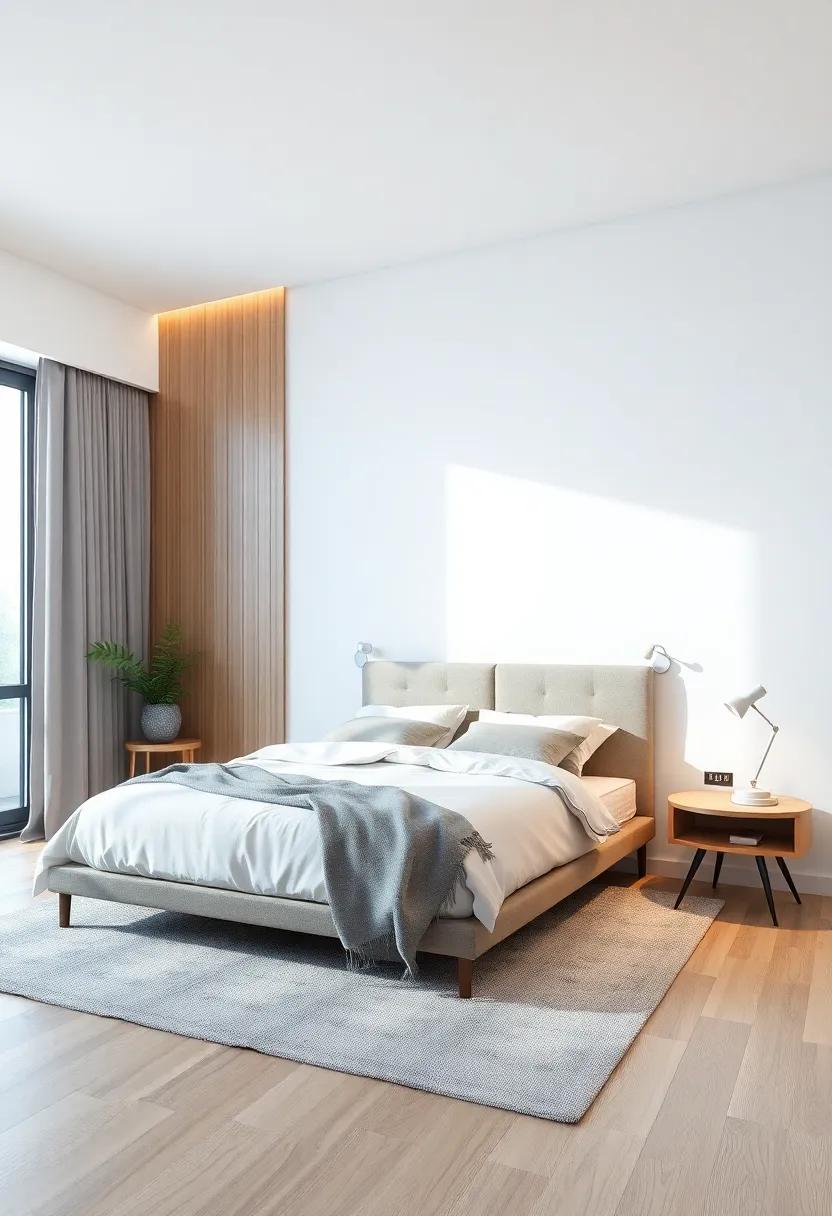
Creating a harmonious atmosphere in a contemporary bedroom begins with the thoughtful arrangement of furniture. Key elements to consider include scale, proportion, and functionality. When placing larger items like the bed or dressers, ensure they do not dominate the space but complement it. positioning the bed away from direct pathways fosters a sense of tranquility, while nightstands should be accessible yet unobtrusive. Consider incorporating furniture that serves dual purposes,such as a bench at the foot of the bed that also provides storage,enhancing the room’s efficiency without compromising on style.
Furthermore, effective spatial orientation encourages smooth movement throughout the area.Aim to establish clear pathways, allowing for easy navigation from one section to another. Utilize rugs to define different spaces, especially in larger rooms, and ensure that all furniture is anchored appropriately within these defined areas. Incorporate elements of natural lighting by arranging furniture to maximize window access, which not only improves the ambiance but also contributes to a more spacious feel. For additional inspiration on functional design, explore resources like Houzz,where various layout ideas are showcased.
Personal Touches: Reflecting Individuality in Design Choices
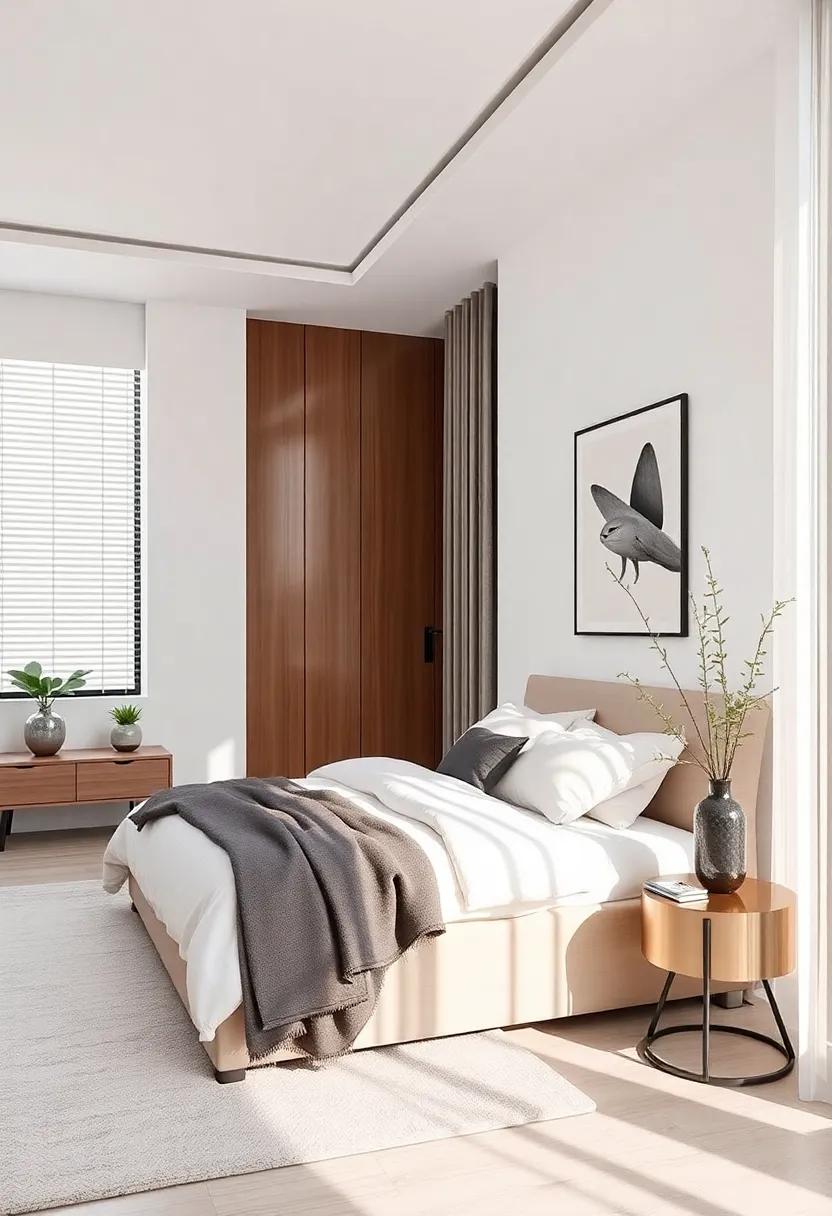
In the realm of contemporary bedroom design, personal touches serve as a vibrant canvas for individual expression. custom elements, such as uniquely crafted furniture and curated art pieces, not only enhance aesthetics but also imbue spaces with the owner’s personality. Consider accent walls adorned with favorite colors or textures,as well as decor items that tell a story—like a dreamy quilt handed down through generations. These choices transform a standard bedroom into a sanctuary that resonates with warmth and individuality, creating a perfect balance between comfort and style.
Furthermore, intentional details can elevate functional designs into something truly special. Explore the integration of multifunctional furniture that reflects personal taste, like a sleek murphy bed or a beautifully designed storage ottoman. this merging of practicality and character can be summed up through key features:
- color Palette: Choose hues that speak to your personality, from calming neutrals to vibrant pops of color.
- Textural Variety: Mix materials like wood, metal, and fabrics to create depth and interest.
- Lighting Design: Incorporate unique light fixtures that elevate the mood while providing essential illumination.
To help inspire your next bedroom redesign, consider looking at exemplary design showcases at sites like Architectural Digest. There, you’ll find a wealth of ideas that push the boundaries of functionality and personal expression.
The Impact of Non-Traditional Layouts on Spatial Perception
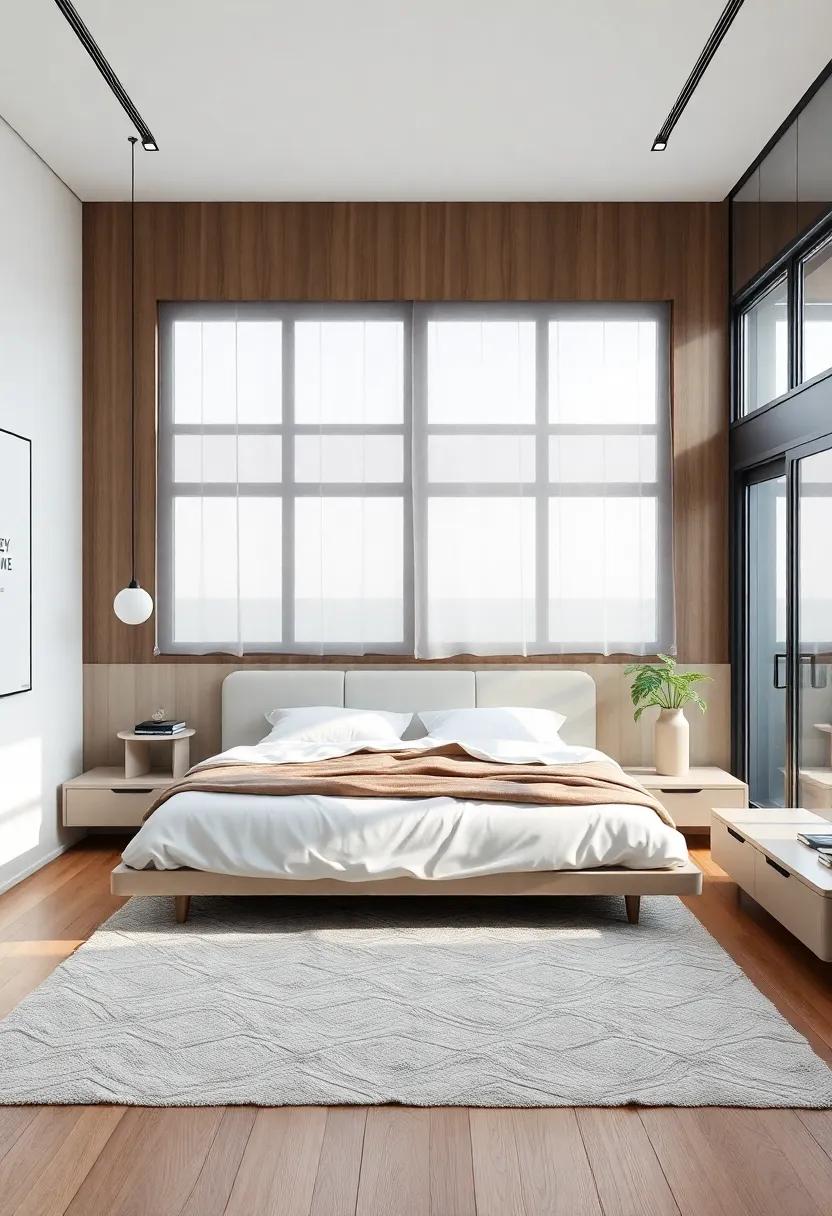
In the realm of contemporary bedroom design, non-traditional layouts have begun to redefine how we perceive and utilize space. By breaking away from the conventional rectangular form, these innovative designs enhance spatial perception, making rooms feel larger or more intimate based on the needs of the user. Techniques such as asymmetrical placements, angled walls, and built-in furniture not only challenge traditional boundaries but also facilitate a more fluid interaction within the space. This can lead to a heightened sense of comfort and functionality,allowing individuals to adapt the layout according to their personal style and daily routines.
Emphasizing an open yet personalized approach, non-traditional layouts often incorporate various functional elements that encourage versatility. Consider these key features:
- Multi-functional furniture: Pieces that transform from a bed to a seating area or include built-in storage.
- Zoned areas: Creating distinct spaces for sleeping, working, or relaxing through furniture arrangement.
- Natural flow: Design that leads the eye and body naturally from one area to another.
The overall impact is a carefully curated environment that promotes both aesthetic appeal and practicality. For those wishing to explore more about the dynamics of space in design, resources such as Architectural Digest provide insights that can inspire further creativity in contemporary interiors.
Mood Elevation: The Influence of Scent and Sound in Bedrooms
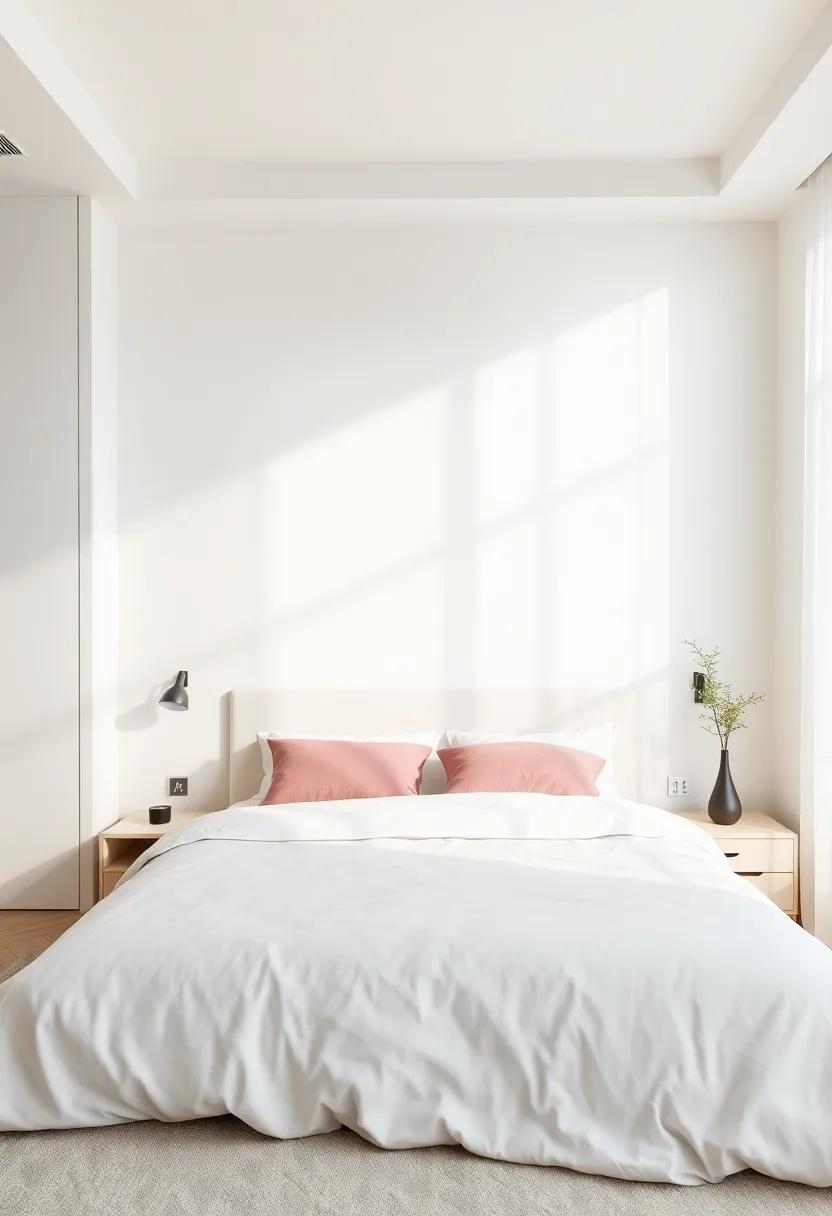
The atmosphere of a bedroom can be profoundly influenced by the harmonious blend of scent and sound. Aromatherapy is widely recognized for its power to elevate mood and induce a sense of relaxation. By incorporating essential oils or scented candles,one can create a sanctuary that promotes calmness and well-being. Consider these scents that are particularly effective in bedrooms:
- Lavender: Known for its calming properties, it reduces anxiety and aids sleep.
- Chamomile: This floral aroma is soothing and helps in creating a restful environment.
- Sandalwood: With its rich,woody fragrance,it is indeed both calming and grounding.
- Vanilla: Sweet and comforting, vanilla promotes relaxation and reduces stress.
Complementing scents with ambient sound can further enhance the bedroom experience. Soft music or nature sounds not only mask disruptive noises but also provide a sense of serenity. Create a personalized playlist or use sound machines that offer a variety of options, such as:
- gentle piano melodies: Evokes tranquility and reflection.
- Rainfall sounds: Mimics nature’s rhythm and lulls you into relaxation.
- Ocean waves: Creates a calming backdrop reminiscent of seaside escapes.
Incorporating both these elements into contemporary bedroom design can transform your space into a holistic retreat. For more on creating sensory experiences, check out Healthline.
Creating Zones: Defining spaces for Work, Sleep, and Leisure
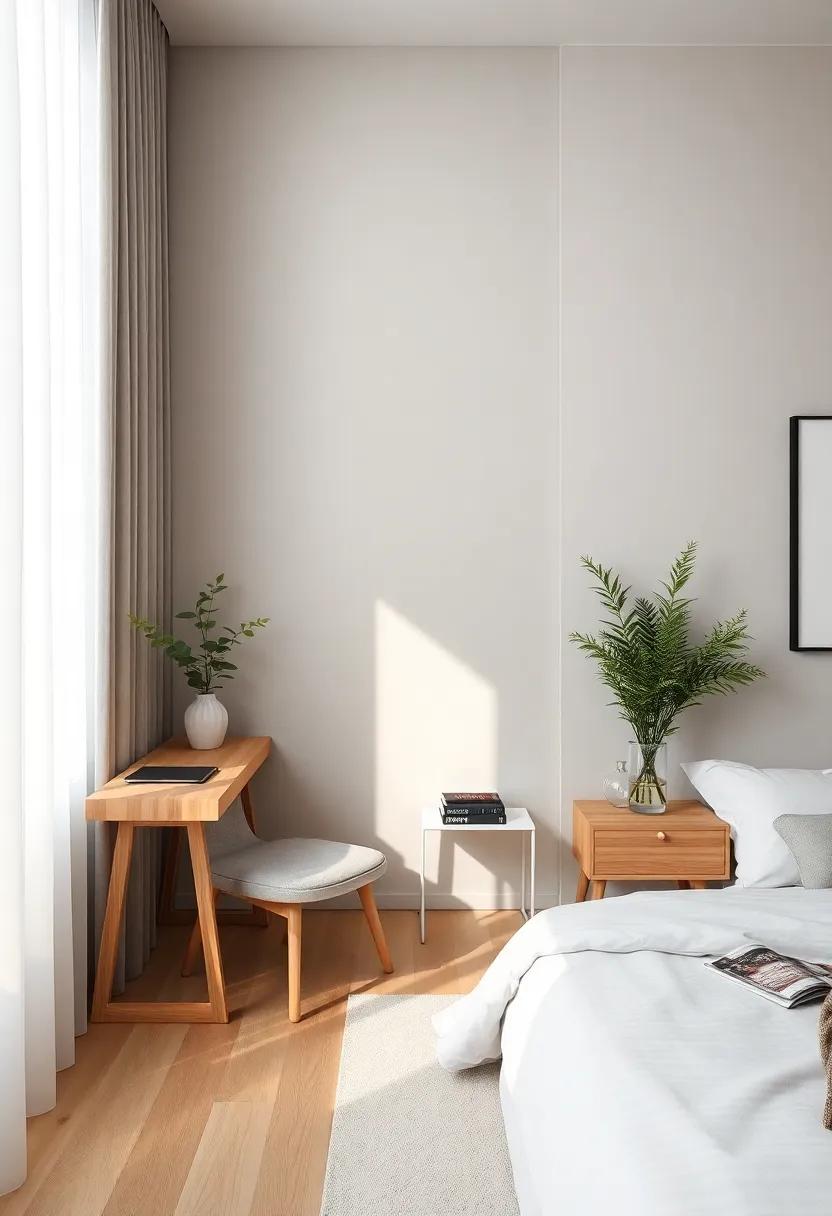
In a world that increasingly demands our attention, creating distinct areas within our living spaces has never been more important. Defining specific zones for work, sleep, and leisure helps establish a harmonious balance that caters to both productivity and relaxation.Consider utilizing furniture that serves dual purposes—like a stylish desk that can easily transition into a bedside table. Implementing removable partitions or open shelving can also effectively delineate areas, offering a sense of privacy while maintaining an airy feel. Such creative solutions foster an environment that encourages focus during work hours while still allowing for a peaceful retreat when it’s time to unwind.
To transform a bedroom into a multi-functional oasis, think about the following ideas:
- Smart Lighting: Adjustable lights can set the mood for work or relaxation.
- Color Schemes: Utilize calming colors for the sleeping area contrasted with energizing hues in the work zone.
- Textural Variations: Incorporate different materials to visually seperate spaces, such as rugs or wall art.
Additionally, incorporating a small seating area for leisure can create a perfect reading nook or casual meeting space within the bedroom. By thoughtfully designing these zones, the bedroom transforms into not just a sleeping area but a vibrant, functional living space that meets all your daily needs. For more inspiration on functional design, check out Architectural Digest.
Visionary Designs: cutting-Edge Concepts for the Future of Bedrooms
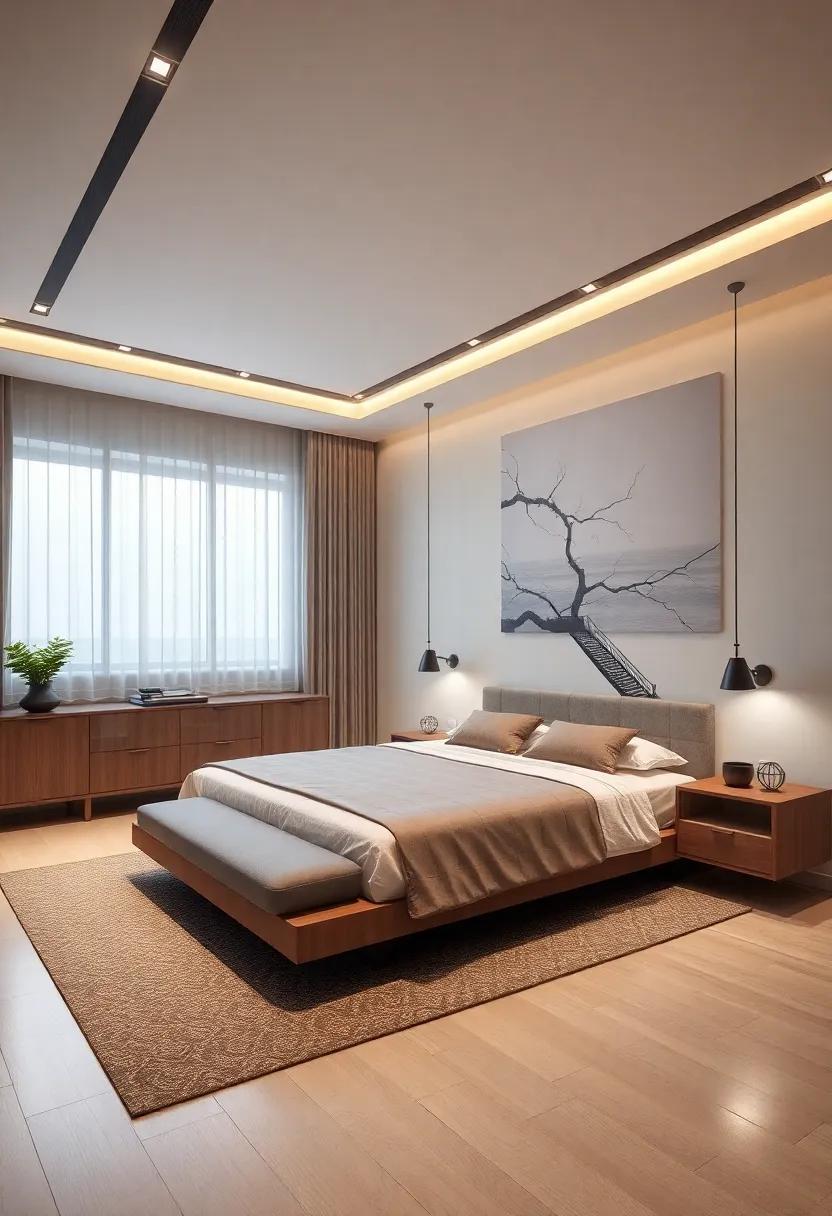
As we step into a new era of home design, the bedroom has evolved into a sanctuary of wellness and innovation. Integrating advanced materials and intelligent technology, today’s bedroom concepts are centered around creating a harmonious blend of aesthetics and functionality. Smart textiles that regulate temperature and adapt to sleep patterns, along with multifunctional furniture that maximizes space without sacrificing style, are at the forefront of these visionary designs. The incorporation of biophilic elements,such as living walls or natural light optimization,not only enhances the visual appeal but also fosters a deeper connection with nature,allowing for a serene environment conducive to restful sleep.
Moreover, sustainability takes a prime role in contemporary bedroom designs, where eco-friendly materials and renewable energy solutions are increasingly embraced. Features like modular shelving, which can be easily reconfigured, ensure versatility as personal needs evolve over time. With the rise of personalized design,more homeowners are opting for custom solutions that reflect their unique styles and preferences. This shift encourages an interactivity within the space, as design choices are tailored to enhance both comfort and individual expression. In essence, the future of bedrooms is not just about aesthetics; it is a seamless integration of style, comfort, and innovation. For further inspiration on modern bedroom designs, visit Architectural Digest.
In Retrospect
As we conclude our exploration of modern comfort in contemporary bedroom spaces, it’s clear that functional design is more than just an aesthetic choice—it’s a thoughtful response to the way we live today. The harmonious blend of form and function invites us to curate environments that not only reflect personal style but also enhance our daily experiences.
In a world that frequently enough pulls us in multiple directions, these thoughtfully designed spaces become sanctuaries of rest and rejuvenation. By embracing the principles of modern comfort, we can transform our bedrooms into havens that support our well-being, inspire creativity, and promote relaxation.
So, as you embark on your own journey of redefining your bedroom, consider the balance between beauty and practicality. The art of functional design awaits you, ready to turn your personal retreat into a masterpiece of modern living. a bedroom isn’t just a space; it’s a canvas where the essence of comfort, style, and functionality converge.
As an Amazon Associate I earn from qualifying purchases.

